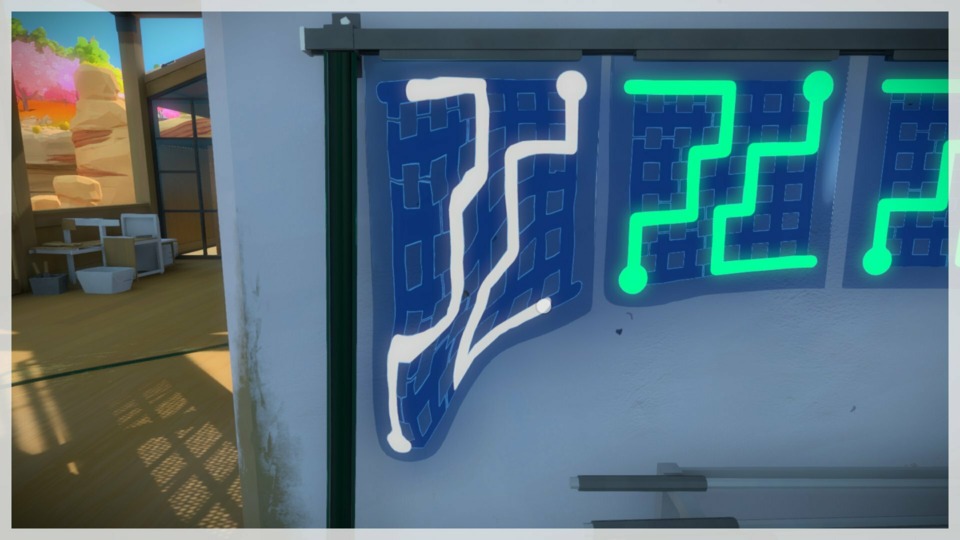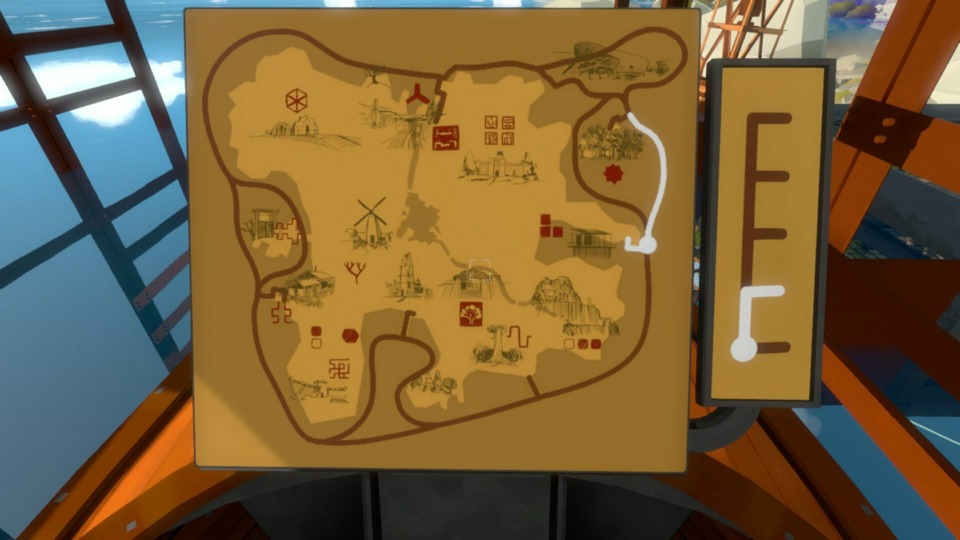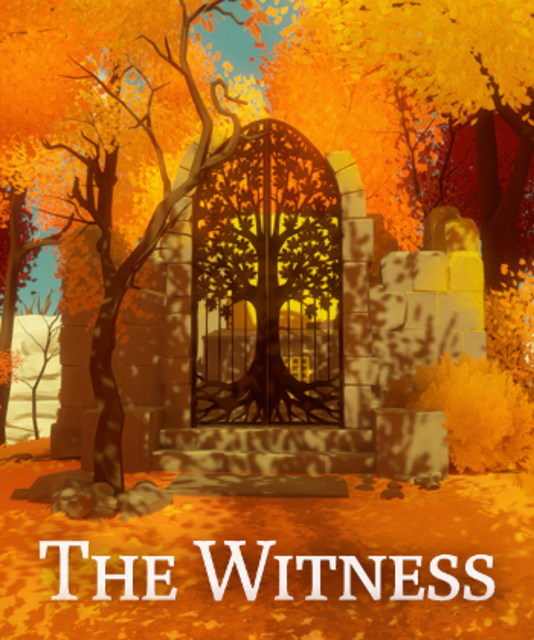
A bit of a somber time around these parts of late, and so what better fit for this week's Indie Game than a contemplative first-person puzzle game with its own ruminations on the meaning of life and the future? Before we start, I actually want to shout out a Giant Bomb buddy of mine, @omghisam, who actually gifted me the PC version of The Witness some five years back around the time when it first launched, and I had to sheepishly begin the Steam refunding process because it wasn't anywhere near optimized for weaker systems like mine. As much as I sorely wish that I could end that anecdote with "and now I have something better than a potato to run it on," the reality is that I was finally able to get around to it after it was recently made freely available to all PS4 owners as part of their "Play at Home" initiative. (Disclaimer: There are some mild image spoilers to follow, if that's a concern.)
The Witness was Jonathan Blow's next game after Braid: the time-travelling platformer that opened a lot of doors for the Indie developer community. It established a template for a very popular type of game - the thinky puzzle-platformer with deeper artistic aspirations - and it, along with a handful of others chronicled in Indie Game: The Movie, proved that a small studio or a single auteur could not only make a living in that low-budget tier of game development but could become a millionaire overnight. It also meant that Blow was under a lot of pressure to produce a follow-up that could blaze a trail to a similar extent. It's hard to judge The Witness in those terms any more - we've long passed that original 2016 zeitgeist and the hype surrounding it, though I'm sure it's found a receptive new audience after this giveaway - but that just makes it easier to judge the game on its own merits.

I'll say this for the Witness: it knows precisely what it's doing with its difficulty curve, if that's the right term. I've seen this a few times with the more exploration-heavy puzzle games (e.g. Fez, Antichamber, Toki Tori 2, or Full Bore) where you begin already possessing everything you need to complete any puzzle in the game, but the world design is structured in such a way that you're unlikely to ascertain the nuances of the more advanced puzzles in your midst until you've paddled around in shallower waters for a while. As you locate and complete the easier puzzle instances, you glean the advanced techniques needed to take on the tougher customers. Even with this new data, the puzzles continue to increase in complexity and difficulty in a manner that makes them satisfying to (eventually) topple one after the other. One significant difference with The Witness is that there's very little in the way of handholding or direction right off the bat, and many of these mid- to late-game techniques require you to go even further afield before you find the areas that teach them to you. There's also very little feedback to let you know how you're progressing: all you have are the trophies, which unlock after significant milestones, and the number of completed instances written on your save files.
The way The Witness structures its puzzles, the escalation of their complexity, and the environment around them is perhaps its greatest strength. Each of the game's puzzles involves drawing a line through a grid from a circular starting point to an "exit" that juts slightly out the grid structure. Early on, drawing these lines around obstacles and breaks in the path is simple, but then the game starts throwing puzzles at you that have tiny symbols either on the path or in the empty spaces between the grid lines. Each symbol has an associated "tutorial set" in the world - a series of puzzles that start with simple instances and give you a clearer sense of how you messed up - but only the first two are anywhere near where you start: those for the colored squares and the little black hexagons. It's after you solve a few of these puzzles, and some less intuitive ones that take the environment into consideration, that you start feeling a sort of confidence about what's going on that the game immediately yanks away from you when you come across a village full of puzzles that all have six or seven different symbols you've never seen before. The island's mainland area are full of these obtuse question marks you're initially forced to abandon, and it's only when you start poking at locations on the coastline and in the distant corners do the pieces start to slowly come together. It's a humbling and slightly frustrating introduction to the island paradise of The Witness, but effective in pushing you into a more judicious frame of mind where you cannot simply assume that everything will be as straightforward as that starting area. I'm certainly nowhere near the end of this adventure, but like any learned individual I now understand enough to know that I really don't understand anything at all. When I come across the audio tapes of Einstein talking about how lost even he becomes when considering the inscrutability of the universe, it rings a little more true - even if it's still ultimately a bit of a stretch to equate colorful line puzzles to discovering the theory of relativity.
The Witness has been a thorn in my side for more than just its brain scrambling puzzles though. There's that aforementioned poor optimization which I'm not sure they ever fixed, though it became apparent quickly once I'd started this second playthrough a possible reason why it caused my old PC to dip to single-figure framerates: the island loads in all at once, and I suspect there might actually be in-game mechanical reasons for why it needed to do that as opposed to developing a means to demarcate the island's various regions with some subtle loading zones (the Uncharted style "inch one's way through a narrow passageway" for instance). The second bugbear, and this only became a factor after a couple of hours, was that I began to feel super barfy to a degree no first-person game has ever managed to make me feel before. The game has a few accessibility options to alleviate this effect - one adds a reticle to give you something to focus on while moving (I suspect this is what fixed it for me) and there are technical options like FOV to mess around with. You usually don't see FOV settings in a PS4 game, which suggests to me that this little motion sickness episode might've been more widespread (I also found several threads about it; many of which had posters were a similar boat as myself, in that this was the first time a game has ever made them feel that way) and the developers needed to include more ways to mitigate it. I don't believe for a second that either of these issues were intentional by the developers, but then the island does have a slightly hostile atmosphere with the roundabout fashion it rolls out its hints and tutorials that uncannily coincides with these inadvertent methods to force me to stop playing.
Beyond even the technical wrinkles though, The Witness is a game that doesn't always do an excellent job of motivating you to keep pushing onwards. The Witness has no collectables, very little lore (it's mostly audio tapes of quotes from famous thinkers), and the UI is barebones and lacks even a basic overworld map: these are of course deliberate design choices that make some amount of sense, as ascertaining the solutions to these puzzles is itself all the reward you should want, but it does make it hard to know what your goals are at any moment, which areas of the island still have puzzles to take on, or anything close to a hint as to what any of this is building towards. Maybe Blow considered the carrot on a stick approach to puzzle design both unnecessary in this day and age and perhaps even a little condescending: that we navigate these Skinner rat mazes solely for the piece of cheese at the end, and not for the journey itself. I don't wholly agree with that philosophy, but I can't say I fully disagree either. There's also the way that monitors (where puzzles are displayed) will occasionally switch themselves off after a wrong answer, forcing you to re-solve the previous in the series, which is both unnecessarily punitive and pointless busywork.

The game that most immediately came to mind while trying to summarize my feelings on The Witness is Outer Wilds, which I reviewed a few months back. It's a comparison that goes beyond their shared critical acclaim and similar slow-burn approach to a first-person puzzle-solving structure, however. It's in how neither game ever made me feel welcome, and how that was possibly by design or all in my head, and even whether or not that low-key animosity was truly detrimental for certain games and their design goals - after all, it's not like the zombies of Resident Evil are rolling out the red carpet for you. I'd bounced off both of The Witness and Outer Wilds initially because of technical faults (definitely not claiming that part was by design) and so was already in a weird place when giving them second chances much later, only to find myself far less patient about their foibles. I was still also able to respect their strengths and understand, in a more objective sense, what others could see in them. First impressions count for a lot in life but I could still give you a number of reasons why I didn't wholly care for Outer Wilds or The Witness without necessarily pointing to a personal vendetta. I think both have lofty aspirations that alone is worth acclaim, and they both contribute significantly to the genre's history even if no other game is made in their likeness, but poor circumstances and rough edges can easily turn a game against you even if it's something that's ostensibly right up your alley.
Rating: 3 out of 5. (So far.)
| < Back to 217: Valthirian Arc: Hero School Story | The First 100 | The Second 100 | > Forward to 219: Neo Cab |

Log in to comment